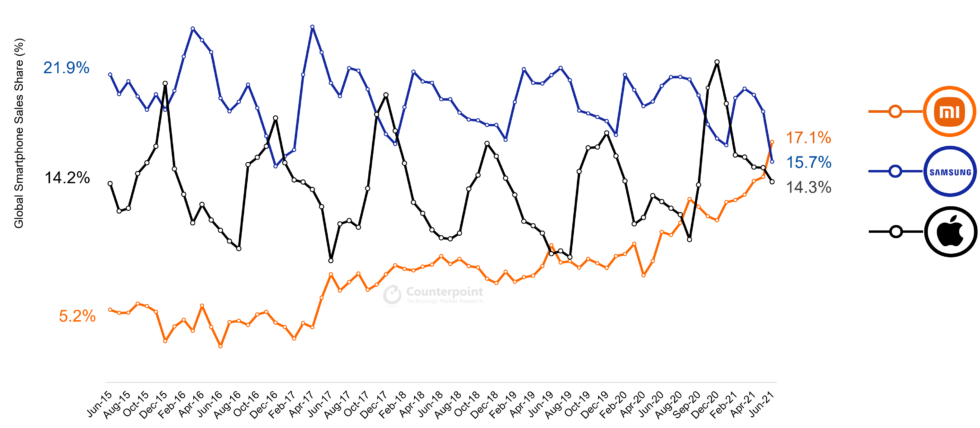Xiaomi takes the smartphone sales crown, and Samsung seems unhappy about it
-
Xiaomi’s Redmi K40 Pro, which has flagship specs (a Snapdragon 888 and 120 Hz display) for around $600.
-
One of Xiaomi’s many crazy ideas is this Xiaomi Mi 11 Ultra. It has a screen in the camera bump.
-
This isn’t a Samsung phone; it’s the Xiaomi Mi Mix Fold.
-
Xiaomi’s 200 W charging tech is fast.
Hot off its climb to the No. 2 spot for Q2 2021, Xiaomi is the world’s biggest smartphone vendor for the first time. That’s according to July’s numbers from Counterpoint Research, which has Xiaomi in first with 17.1 percent of the global market, Samsung in second with 15.7 percent, and Apple in third with 14.3 percent.
Counterpoint says Xiaomi’s market share grew 26 percent month over month. Counterpoint Research Director Tarun Pathak explains why, saying, “Ever since the decline of Huawei commenced, Xiaomi has been making consistent and aggressive efforts to fill the gap created by this decline. The OEM has been expanding in Huawei’s and HONOR’s legacy markets like China, Europe, Middle East, and Africa. In June, Xiaomi was further helped by China, Europe, and India’s recovery and Samsung’s decline due to supply constraints.”
Huawei has been plummeting in the market share charts as the effects of the multi-year US export ban caught up with the company. Huawei keeps making paper announcements, but with the main brand lacking chips and software, plus the sale of sub-brand Honor, there’s not much left of Huawei in the current smartphone market.
Xiaomi covers every possible market segment, with 58 smartphone models currently listed on its global website. Its products include phones as cheap as $100, state-of-the-art foldables like the Mi Mix Fold, and flagship phones like the Mi 11 Ultra, which has a second rear screen in the camera bump and a massive 50 MP, 1/1.12-inch sensor. Xiaomi is aggressive in its home market of China—the world’s biggest smartphone market—and is a major player in India, the second-largest market in the world. The company doesn’t do smartphone business in the US.

As for Samsung, which Xiaomi blew by to become No. 1, Counterpoint says the company is facing temporary problems due to the resurgence of COVID-19 in Vietnam. Samsung has major phone manufacturing facilities in Vietnam, in addition to China and the company’s home country of South Korea. Counterpoint Senior Analyst Varun Mishra said, “Samsung’s production was disrupted in June, which resulted in the brand’s devices facing shortages across channels. Xiaomi, with its strong mid-range portfolio and wide market coverage, was the biggest beneficiary from the short-term gap left by Samsung’s A series.”
“Once Samsung recovers, the ranks are likely to shuffle again,” the site adds.
Despite Counterpoint’s claims that Samsung’s problems are temporary, Samsung doesn’t seem happy with its second-place spot in the market. According to a report from South Korean site The Elec, Samsung Electronics is “extending its management review” of the mobile business, a move The Elec says Samsung does “when the top leadership considers there is a problem with a particular business unit.”
The report says that “Samsung is highly likely to miss its sales target for Galaxy S21,” which so far has sold 13.5 million units during the first half of the year. Over the same period, the previous model, the S20, sold in the mid-20-millions, while older Galaxy S models sold around 30 million. You could argue that customers are keeping smartphones for longer, but Xiaomi doesn’t seem to be facing those problems.
Samsung is in a holding pattern since the leader of the company, Lee Jae-yong (aka Jay Y. Lee), is still in jail on bribery charges. This month, Lee has a parole hearing that could lead to his release, and some people in South Korea are even lobbying for Lee to be pardoned, given how big of a role Samsung plays in South Korea’s economy (the company represents about 15 percent of South Korea’s GDP). The Elec speculates that with Samsung’s leader likely getting out of jail soon, a review of key company divisions might already be underway so that Lee can quickly make decisions upon his release.
https://arstechnica.com/?p=1785499